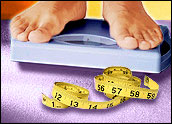
People anticipating weight gain over the holiday season can look toward mobile technology to help them shed those extra pounds, suggests new research.
Patients in weight loss treatment programs lost more weight when they coupled nutritional coaching and exercise with prompts from mobile apps, reported Northwestern University researchers in a study published in the Archives of Internal Medicine.
The Northwestern team assigned 69 overweight and obese patients to either a standard weight loss program or treatment that integrated mobile technology prompts for one year. They were issued weekly activity and caloric intake goals, and they weighed in at three-, six-, nine- and 12- month benchmarks.
The participants in the mobile program tracked their progress through an app on their smartphone, which shared their data with a behavioral coach who offered suggestions for reaching their weight-loss goals. The other group recorded their daily exercise and eating habits on paper.
More Interaction, Better Results
The patients who received coaching via the smartphone and attended at least 80 percent of the educational sessions offered lost an average of 15 pounds and kept it off throughout the year-long experiment.
Those who were coached but did not attend the informational meetings experienced an average weight loss of 8.6 pounds.
About one third of the participants in the mobile program lost at least 5 percent of their body weight during the first three months, while those in the control group lost nothing.
Participants in the control group who had an app but did not receive any additional education did not lose weight.
The authors of the study did not respond to our request for further details.
Baby Steps
The best apps for weight loss are ones that serve as a daily reminder to walk an extra 200 steps or scale down from a super-sized fast food meal, said Michael Zemel, chief scientific officer at NuSirt Sciences.
Apps are good ways to monitor those tiny changes that can help maintain weight, whereas a more intense fitness and diet plan might overwhelm patients, he said. The most effective apps alert users of small but potentially harmful daily habits, such as long periods of being sedentary.
“Weight management is extraordinarily difficult,” Zemel, told TechNewsWorld. “Everybody in America knows that if they eat less and exercise more they can lose weight, but they don’t — and it’s not because they don’t intend to, but life gets in the way.
“People feel like they have to make big changes in their lifestyle to lose weight, but the beauty of some of the apps out there is that they help you make the small changes that can really manage weight.”
Find Your Own App
Mobile technologies are most effective in helping users reach fitness or weight-loss goals when they are combined with other methods — such as the health coaching offered in the Northwestern study, said Dixie Stanforth, professor of kinesiology and health education at the University of Texas at Austin.
Although mobile technology was not singlehandedly responsible for enabling participants’ weight loss, it could be a helpful component of an overall treatment program, the Northwestern researchers stressed.
“I think apps also have tremendous potential when linked with other behavioral strategies,” the UT’s Stanforth told TechNewsWorld. “You can use the app as a nudge or a reminder, or simply a nag to keep you on task once you commit to a particular behavior. I think apps have greatest promise in this setting, where they are used as a tool to reinforce a behavior or the commitment to a behavior.”
Most importantly, however, is personalizing technology integration into a weight loss treatment program. As smartphone and mobile device use becomes more popular among people who aren’t particularly tech-savvy, health practitioners should consider that the most-effective apps must be easy to use and dispense just the right amount of motivation, NuSirt’s Zemel noted.
That is going to be different for everyone, said Stanforth. So shopping around for an app that is going to help users shed some extra weight might take a little extra homework.
The payoff for both weight loss coordinators and their patients will be worth it, though, she added.
“Bottom line for me is to work with people to try to find what works for them,” Zemel concluded. “Different personalities, brain types [and] information processors handle this type of input differently. Matched with the right person, apps have huge potential.”





















































